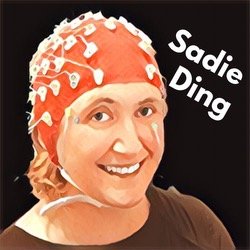“A hilarious and riveting journey.”
— David Eagleman
“A fascinating story that
will make you rethink how
you see the world.”
— John Robison
“The zippy prose and humor
will keep readers turning pages.
Readers will be enlightened and
charmed in equal measure.”
—Publishers Weekly
“Sadie Dingfelder
was born funny,
in both senses of the word.”
— Dave Barry
Science writer Sadie Dingfelder has always known that she’s a little quirky.
But it’s not until she accosts a stranger in a grocery store that she realizes something is amiss.
With a mixture of curiosity and dread, Dingfelder starts contacting neuroscientists and lands herself in scores of studies. In the course of her nerdy midlife crisis, she discovers that she has prosopagnosia (faceblindness), stereoblindness, aphantasia (an inability to create mental imagery), and a condition called severely deficient autobiographical memory (SDAM).
As Dingfelder begins to see herself more clearly, she discovers a vast well of hidden neurodiversity in the world at large. There are so many different flavors of human consciousness, and most of us just assume that ours is the norm. Can you visualize? Do you have an inner monologue? Are you always 100 percent sure whether you know someone or not? If you can perform any of these mental feats, you may be surprised to learn that many people—including Dingfelder—can’t.
A lively blend of personal narrative and popular science, Do I Know You? is the story of one unusual mind’s attempt to understand itself—and a fascinating exploration of the remarkable breadth of human experience.
About Sadie
Sadie Dingfelder is a freelance science journalist. Her writing has appeared in the New Yorker, National Geographic, and the Washington Post. A former staff reporter at the Washington Post Express, Dingfelder also served as senior science writer at the Monitor on Psychology magazine, covering new findings in neuroscience, cognitive science, and ethology for members of the American Psychological Association.




